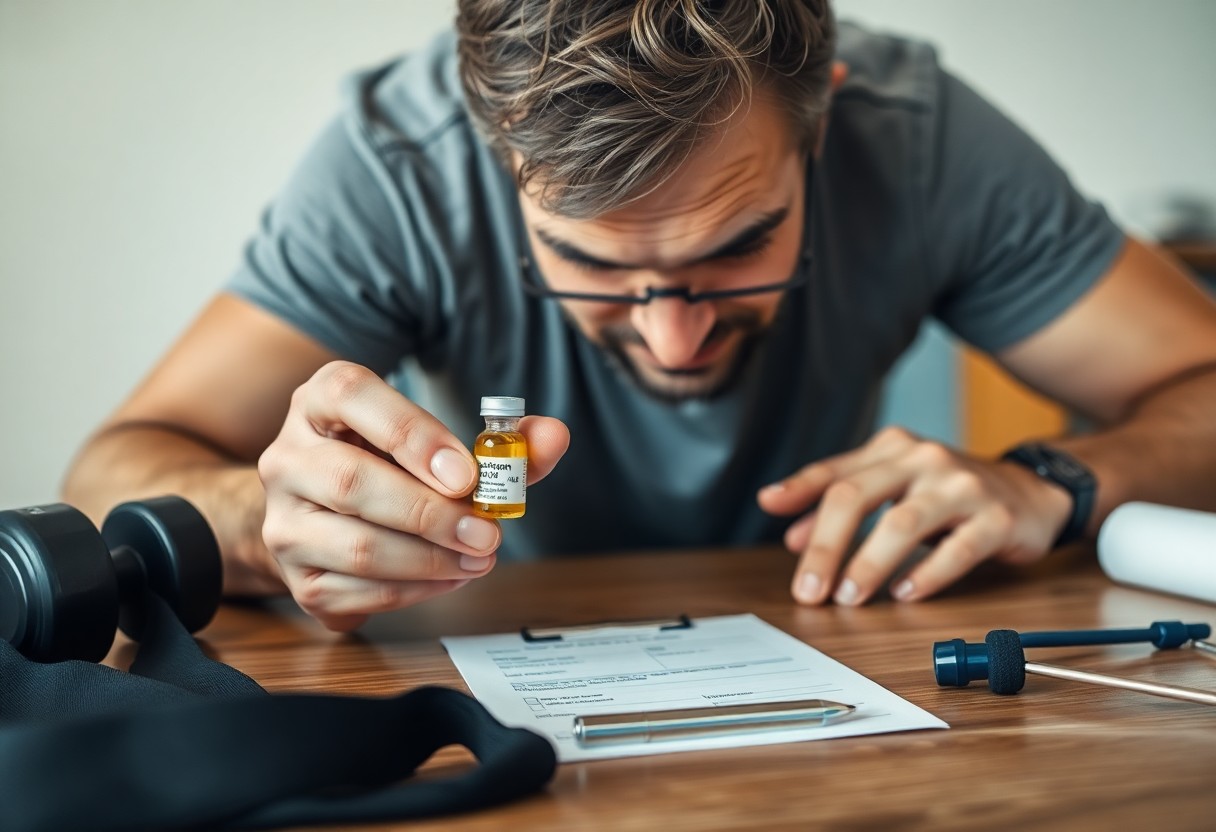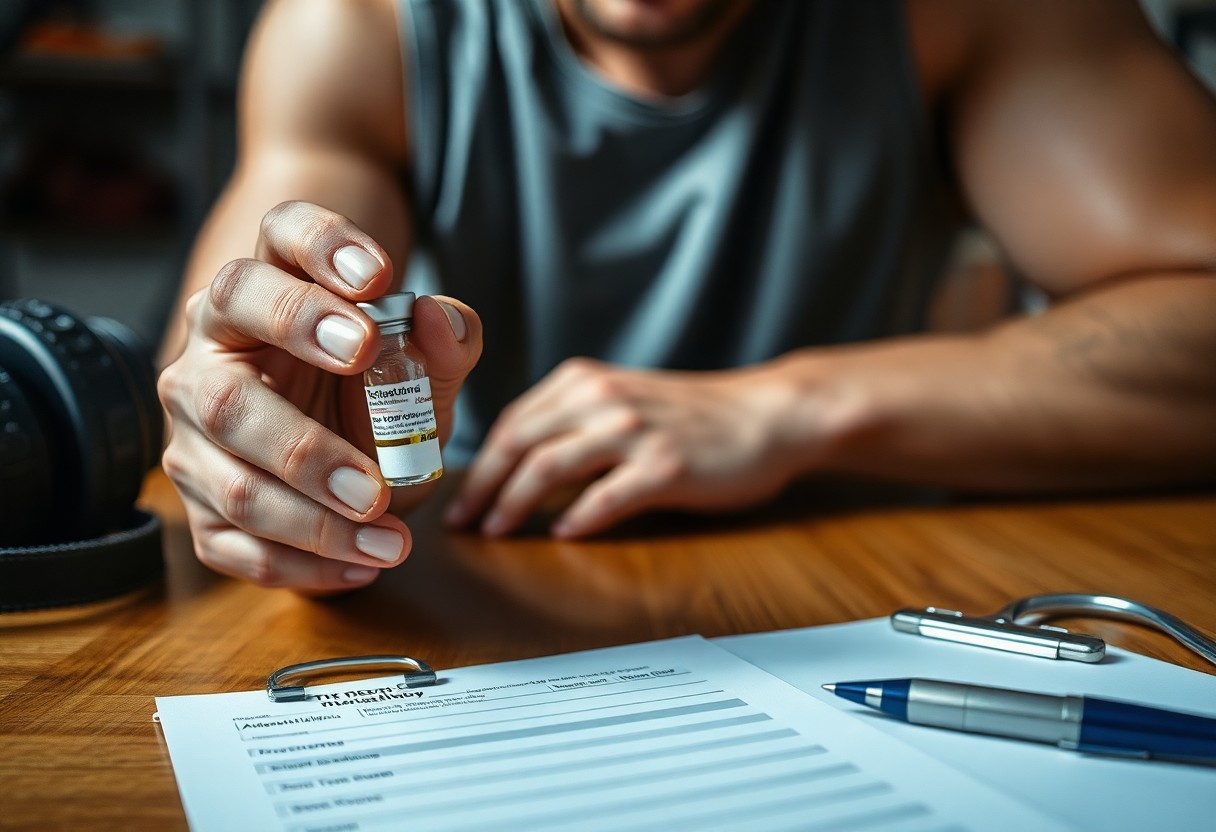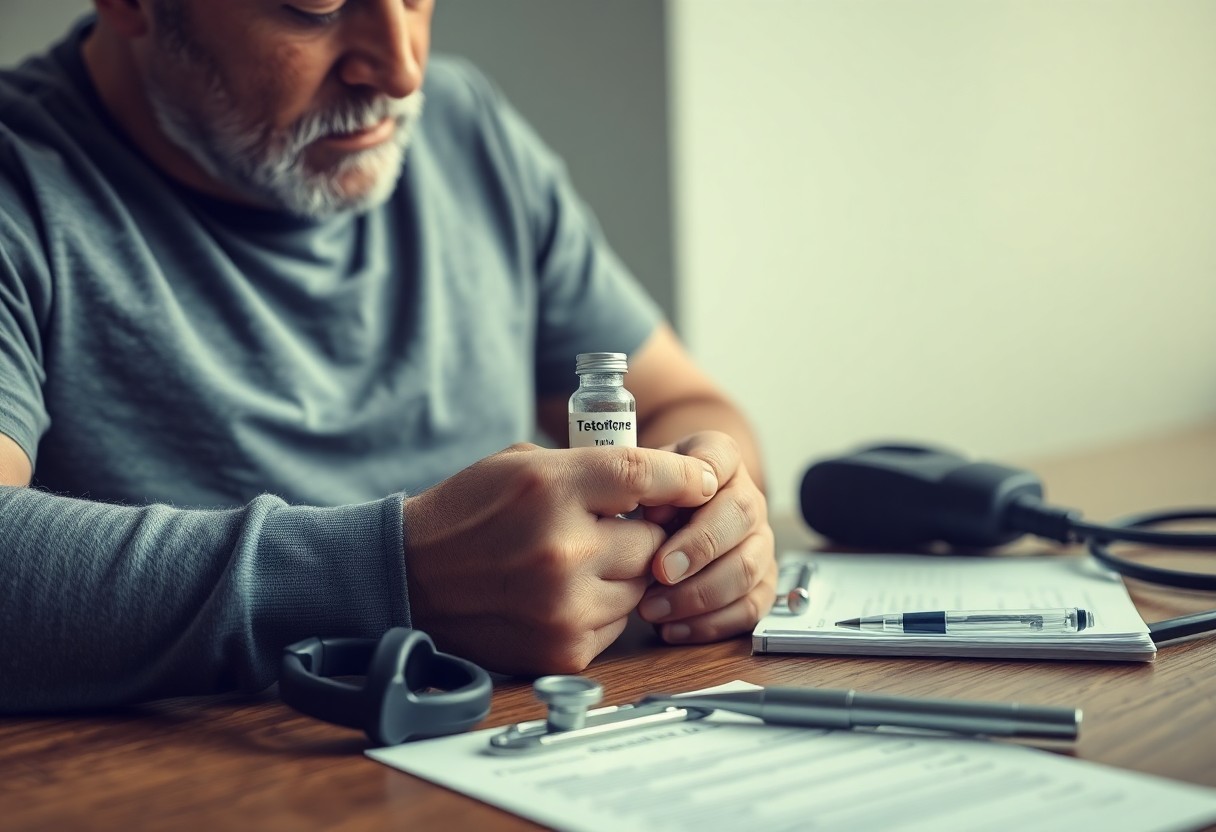With age, your body’s natural testosterone production can decline, leading to various physical and emotional changes that may impact your quality of life. If you’ve been experiencing unexplained fatigue, decreased muscle mass, low libido, or mood changes, these could be indicators that your testosterone levels are below optimal range. Your body relies on this necessary hormone to maintain energy, strength, and overall well-being, making it important to recognize when professional intervention might be necessary. Understanding the signs of low testosterone can help you take proactive steps toward addressing these concerns with a qualified healthcare provider.

Key Takeaways:
- Common signs of low testosterone include persistent fatigue, decreased muscle mass, and reduced sex drive, which may indicate the need for medical evaluation
- Testosterone levels naturally decline with age, but symptoms like mood changes, difficulty concentrating, and weight gain could suggest a treatable hormone imbalance
- Consulting with a qualified healthcare provider for blood tests and symptom assessment is crucial before starting any hormone replacement therapy
Physical Signs and Symptoms
For many men, the physical manifestations of low testosterone can significantly impact daily life. These signs often develop gradually, making them easy to overlook or attribute to normal aging. Understanding these physical indicators can help you identify whether you might benefit from testosterone replacement therapy.
Decreased Muscle Mass and Strength
For men experiencing low testosterone, one of the most noticeable changes can be a reduction in muscle mass and strength, even if you maintain your regular exercise routine. Studies show that testosterone levels directly influence muscle protein synthesis, with low levels resulting in up to 20% decrease in muscle mass over time.
Increased Body Fat and Weight Gain
Gaining weight, particularly around your midsection, might signal low testosterone levels. You may notice changes in your body composition even without significant changes in your diet or exercise habits. Research indicates that men with low testosterone are 2.4 times more likely to be obese.
Strength training and diet alone might not be enough to combat these changes when your testosterone levels are low. The hormone plays a key role in regulating fat distribution and metabolism, affecting how your body processes and stores fat.
Chronic Fatigue and Low Energy
Muscle weakness and persistent fatigue, despite getting adequate sleep, can signal low testosterone. You might find yourself struggling to get through your daily activities or lacking the energy for workouts that were once routine.
Hence, if you’re experiencing unexplained exhaustion that affects your quality of life, it could be related to low testosterone levels. Studies show that up to 77% of men with low testosterone report significant fatigue symptoms.
Changes in Body Hair Growth
The pattern and thickness of your body hair can change significantly with low testosterone levels. You might notice thinning facial hair, slower beard growth, or loss of body hair on your chest, arms, or legs.
Body hair changes often occur gradually and may be accompanied by other physical symptoms. Research indicates that approximately 65% of men with low testosterone experience some degree of body hair changes, making this a significant indicator for potential hormone imbalance.
Emotional and Mental Indicators
If you’re experiencing unexplained changes in your emotional well-being and cognitive function, low testosterone levels might be the underlying cause. Studies show that testosterone plays a vital role in regulating mood, mental clarity, and sleep patterns. Research indicates that up to 23% of men with low testosterone experience symptoms of depression and cognitive decline.
Mood Changes and Depression
Before dismissing your persistent low mood as stress, consider how your testosterone levels might be affecting your emotional state. You may notice increased irritability, unexplained sadness, or a general lack of motivation. Studies have shown that men with low testosterone are up to four times more likely to experience clinical depression compared to those with normal levels.
Reduced Mental Focus and Clarity
On a daily basis, you might find yourself struggling to concentrate or experiencing what many describe as “brain fog.” Your ability to focus on tasks, make decisions, or process information quickly may be compromised due to suboptimal testosterone levels.
Mood swings and cognitive difficulties can significantly impact your professional and personal life. You might notice that tasks that once came easily now require more effort, or you’re having trouble maintaining your usual level of productivity. Research shows that 45% of men with low testosterone report difficulties with concentration and memory.
Sleep Disturbances
Sleep problems can manifest as difficulty falling asleep, staying asleep, or achieving restful sleep. You might find yourself waking up frequently during the night or feeling unrested despite getting adequate hours of sleep. Studies indicate that 28% of men with low testosterone experience sleep disturbances.
Plus, poor sleep quality creates a cycle that can further impact your testosterone levels. When you don’t get proper rest, your body produces less testosterone, which in turn can make it harder to sleep well. This pattern can affect your energy levels, mood, and cognitive function throughout the day.
Sexual Health Concerns
After age 30, testosterone levels naturally decline by 1-2% annually, significantly impacting your sexual health. These changes can manifest in various ways, affecting your intimate relationships and overall quality of life. Understanding these signs helps you identify when it’s time to seek professional evaluation for potential testosterone replacement therapy.
Decreased Libido
Above all, a noticeable drop in your sex drive might be one of the first signs you’ll notice. If you’re experiencing reduced interest in sexual activity or finding it difficult to maintain the same level of desire you once had, low testosterone could be the underlying cause. Studies show that up to 4 in 10 men over 45 report decreased libido related to testosterone decline.
Erectile Dysfunction
An inability to achieve or maintain erections could signal testosterone deficiency. While occasional difficulties are normal, persistent problems with erectile function may indicate your testosterone levels have fallen below optimal ranges. Research indicates that approximately 30% of men with low testosterone experience erectile dysfunction.
Also, your erectile function depends on proper testosterone levels to maintain healthy blood flow and nerve sensitivity. When you’re experiencing ongoing erectile issues, it’s important to understand that this could be your body signaling a hormonal imbalance that requires medical attention.
Fertility Issues
Across the spectrum of sexual health concerns, fertility problems can be particularly distressing. You might notice changes in your sperm production or quality, which can affect your ability to conceive. Low testosterone can significantly impact your reproductive capabilities.
Issues with fertility often manifest through decreased semen volume and reduced sperm count. When your testosterone levels are suboptimal, you may experience up to a 50% reduction in sperm production. This can severely impact your fertility potential and should prompt you to seek professional evaluation.
Age-Related Factors
To understand your potential need for testosterone replacement therapy, it’s important to consider age-related changes in hormone production. Your body naturally experiences hormonal shifts as you age, typically beginning around age 30.
- Testosterone levels decrease by 1-2% annually after age 30
- Peak testosterone levels occur in early adulthood
- Hormone decline can affect multiple body systems
After age 40, you may notice more pronounced symptoms of declining testosterone levels.
Natural Testosterone Decline
Factors affecting your testosterone levels include age, lifestyle habits, and genetic predisposition. Your body’s natural production of this vital hormone gradually decreases over time, with most men experiencing a noticeable decline between ages 40-50. After reaching 50, you might find that symptoms become more pronounced, potentially affecting your quality of life.
Risk Factors and Medical Conditions
Before considering testosterone replacement therapy, you should be aware of various risk factors that can accelerate hormone decline.
- Obesity and metabolic disorders
- Chronic stress and sleep issues
- Certain medications
- Type 2 diabetes
Recognizing these risk factors early can help you make informed decisions about your hormone health.
It’s important to understand how these conditions can impact your testosterone levels and overall well-being.
- Excess body fat increases estrogen production
- Poor sleep reduces testosterone synthesis
- Stress elevates cortisol, suppressing testosterone
- Some medications directly affect hormone production
Recognizing these connections allows you to take proactive steps in managing your hormone health.

Diagnostic Process
Once again, your journey to testosterone replacement therapy begins with a comprehensive diagnostic process. You’ll need to undergo several evaluations to determine if TRT is the right solution for your symptoms. This process typically involves blood testing, medical history review, and physical examination to create a complete picture of your hormonal health.
Blood Test Requirements
Around 8-10 AM is the optimal time for your testosterone blood test, as levels naturally peak in the morning. You’ll need multiple blood samples taken on different days to establish your baseline testosterone levels. Your doctor will also check related hormones like estradiol, prolactin, and thyroid function to ensure accurate diagnosis and appropriate treatment planning.
Medical History Evaluation
The medical history evaluation helps identify underlying causes of your symptoms and potential contraindications for TRT. Your doctor will review your current medications, lifestyle factors, and family history of certain conditions. This step is vital for developing a safe and effective treatment plan tailored to your specific needs.
Considering your overall health status, the evaluation will also explore any previous hormone-related treatments, prostate health issues, or cardiovascular conditions. You’ll need to discuss your sleep patterns, stress levels, and exercise habits, as these factors can significantly impact hormone production and treatment outcomes. This thorough assessment helps ensure that TRT is both safe and beneficial for your specific situation.
When to Seek Professional Help
Keep track of your symptoms and consult a healthcare provider if you experience persistent signs of low testosterone. If you notice multiple symptoms affecting your daily life, such as severe fatigue, significant muscle loss, or ongoing mood changes lasting more than two weeks, it’s time to schedule an appointment with a specialist at RR Med Aesthetics for a comprehensive hormone evaluation.
Recognizing Critical Symptoms
Across your daily activities, watch for telltale signs that may indicate low testosterone levels. These include unexplained weight gain, decreased muscle mass, reduced sex drive, and persistent fatigue. If you experience three or more of these symptoms simultaneously, especially if they interfere with your quality of life, you should consider professional evaluation at our medical spa.
Importance of Early Intervention
Importance of addressing hormone imbalances early cannot be overstated. When you take action at the first signs of low testosterone, you can prevent further complications and achieve better treatment outcomes. Studies show that men who seek treatment early experience up to 60% improvement in symptoms within the first three months of therapy.
Professional treatment at RR Med Aesthetics involves comprehensive hormone testing and personalized therapy plans. Your initial consultation will include detailed blood work to measure your testosterone levels, allowing our specialists to create a tailored treatment approach that addresses your specific needs and health goals. By choosing early intervention, you can optimize your results and restore your hormonal balance more effectively.
Summing up
On the whole, if you’re experiencing symptoms like persistent fatigue, decreased muscle mass, low libido, or mood changes, your body might be signaling the need for testosterone replacement therapy. Your energy levels, physical performance, and overall well-being can significantly improve with proper hormone balance. If you recognize these signs, it’s important to consult with a qualified healthcare provider who can evaluate your testosterone levels through comprehensive testing. Your path to feeling more energetic and confident starts with understanding these indicators and taking action to address them.
FAQ
Q: What are the physical symptoms that indicate low testosterone levels?
A: Common physical signs include unexplained weight gain, decreased muscle mass, increased body fat, chronic fatigue, and reduced strength. You may also experience slow recovery after exercise and difficulty building muscle despite regular workouts. These symptoms often develop gradually and can significantly impact your daily activities.
Q: How does low testosterone affect mood and mental well-being?
A: Low testosterone levels can lead to noticeable changes in mental health, including increased irritability, difficulty concentrating, depression, and anxiety. Many men experience reduced motivation, lack of confidence, and mood swings. These emotional changes often accompany physical symptoms and can affect both personal and professional relationships.
Q: What sexual health changes might indicate the need for testosterone therapy?
A: Sexual health indicators include decreased libido, erectile dysfunction, reduced morning erections, and difficulty maintaining intimate relationships. You may notice a significant decline in sexual desire and performance compared to your previous normal levels. These changes can impact both sexual function and overall relationship satisfaction.
Q: How does age relate to testosterone deficiency symptoms?
A: While testosterone naturally decreases with age, significant symptoms typically appear in men over 40. However, younger men can also experience low testosterone due to various factors. The severity and combination of symptoms may vary by age group, with some men experiencing decline earlier than others based on genetics, lifestyle, and overall health.
Q: What sleep and energy-related signs suggest low testosterone?
A: Notable signs include persistent fatigue despite adequate rest, disturbed sleep patterns, increased daytime sleepiness, and reduced energy levels affecting daily activities. You might find yourself requiring more sleep than usual yet still feeling tired, or experiencing insomnia despite physical exhaustion. These sleep disruptions can create a cycle that further impacts hormone levels.





